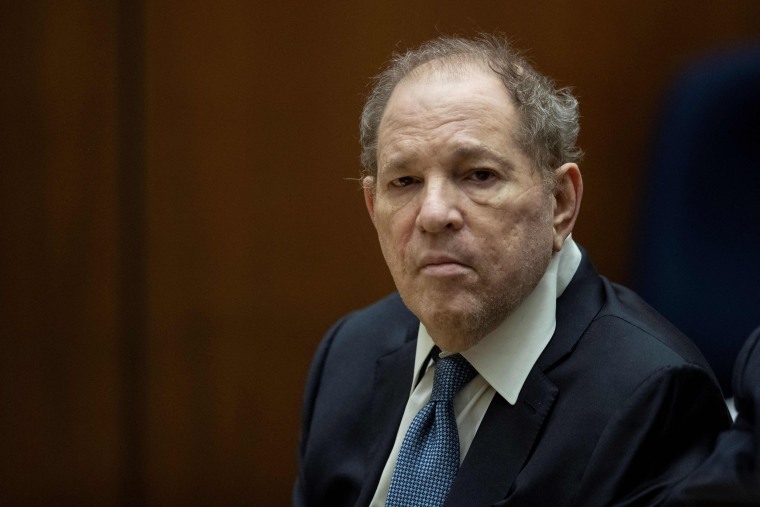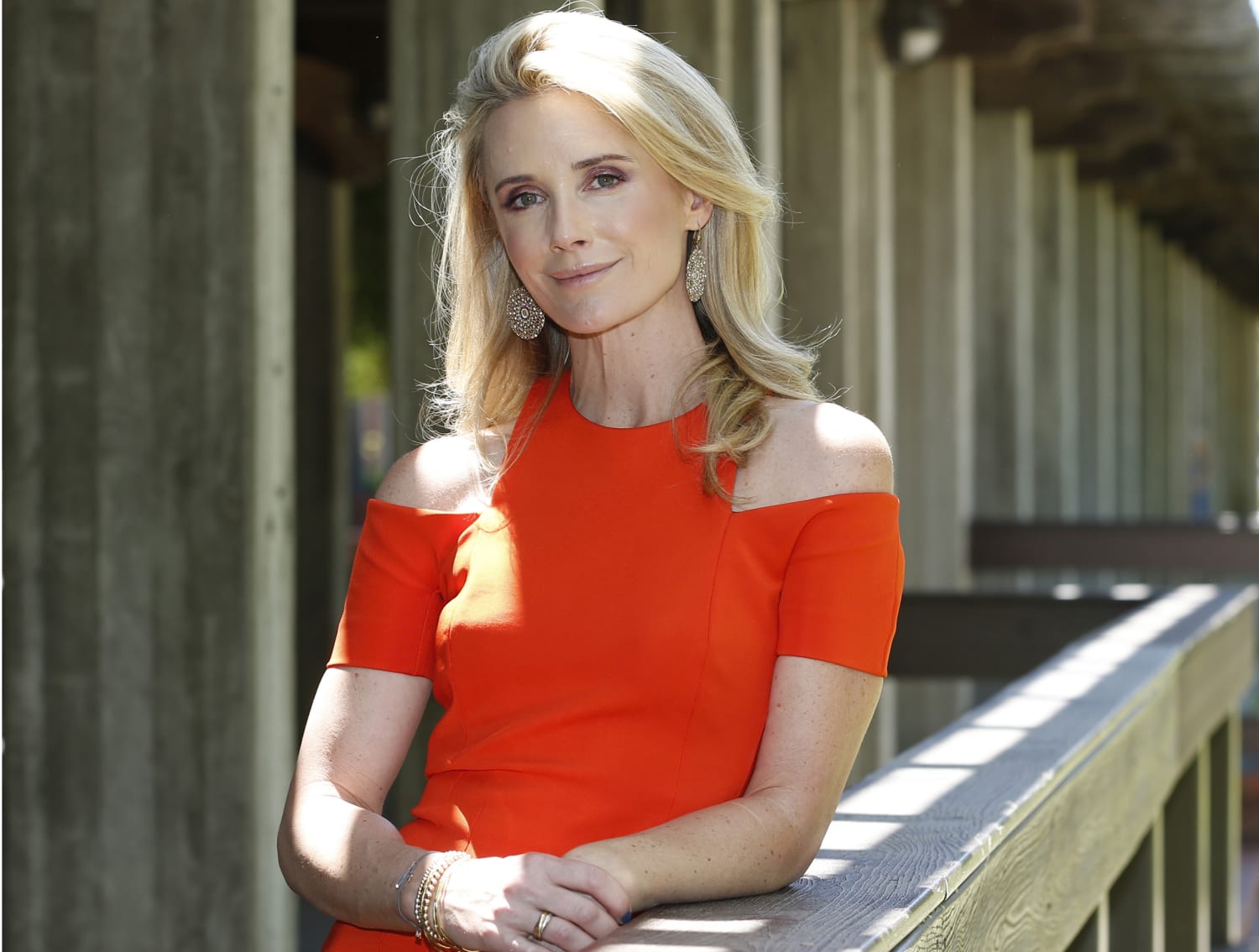Jennifer Siebel Newsom, a documentary filmmaker and actor who is married to California Gov. Gavin Newsom, broke down crying Monday at Harvey Weinstein’s sex crimes trial, where she is testifying as one of the disgraced movie producer’s accusers.
She wept when prosecutors asked her whether she saw Weinstein in the courtroom.
“He’s wearing a suit and a blue tie, and he’s staring at me,” she said.
Siebel Newsom is known in the Los Angeles courtroom as “Jane Doe #4,” but she was identified by her real name to NBC News. (NBC News does not name sexual assault victims unless they have identified themselves publicly.)
Weinstein is on trial five years after The New York Times and The New Yorker first published explosive investigations into allegations of a pattern of sexual misconduct. The stories inspired a wider reckoning with abuses of power in entertainment and other high-profile industries.
In an essay for HuffPost published a day after The New York Times ran its first exposé, Siebel Newsom accused Weinstein of “aggressive advances” but did not provide more specific details.
Weinstein, who once lorded over Hollywood as a powerful film producer before he became a focal point of the #MeToo movement, is charged with 11 counts of rape and sexual assault. He has pleaded not guilty.

He is already serving a 23-year sentence for a rape conviction in New York, the former home of his defunct studio, The Weinstein Company.
Siebel Newsom told jurors how she met Weinstein, then testified in graphic and emotional terms about the night that she says he assaulted her in a hotel suite.
In opening statements, one of Weinstein’s lawyers said his client’s sexual relationship with Siebel Newsom as consensual.
Siebel Newsom said that she met Weinstein at the Toronto International Film Festival in September 2005, when she was an actor with a few credits to her name. She was not in a relationship with Gavin Newsom at the time.
She said that Weinstein approached her and that other people backed away “like the Red Sea was parting — I don’t know if it was deference or fear.” She said he wanted to know who she was and why she was there, recalling that she felt “intimidated” and “flattered.”
Weinstein asked to meet with her later, and she agreed in part because she “felt like there was a genuine interest in talking about my work,” she said.
He asked for her phone number so they could continue their conversation in Los Angeles, Siebel Newsom testified, explaining that she “thought that he would reach out in the future to talk to me more about, give me advice on work.”
In Los Angeles, Weinstein came over to her home one day to drop off a gift: a book on the legendary Hollywood mogul Louis B. Mayer. He came in for around five minutes, a brief visit she described as “very awkward.”
Weinstein then invited Siebel Newsom to meet with her at the Peninsula Hotel in Beverly Hills, where she assumed they would meet at the bar and discuss her career. Instead, Siebel Newsom said she was told to meet Weinstein in a hotel suite.
“I was confused. I was a little hesitant,” Siebel Newsom testified.
She said she nervously took the elevator to “this big, grand suite.” She recalled that she was “uncomfortable,” but “I just tried to be present and I just waited.”
Prosecutors asked why she waited. “Because you don’t say no to Harvey Weinstein,” Siebel Newsom said. “He could make or ruin your career.”
When the producer came in, he didn’t seem interested in discussing her career, she testified.
“He abruptly got up and said I’m going to go get more comfortable,” Siebel Newsom said.
He called to her from down the hall, she testified while weeping. She found him in his bathrobe. He was touching his penis, then “grabbed” her and “tried to get me to touch him” she said.
Siebel Newsom said she felt “panicked” and “frozen.”
“I was scared. This was not why I came here. It was like a complete manipulation of why I was there, and I just remembered physically trying to back away.”
Siebel Newsom, breaking down in sobs, testified that she pleaded with Weinstein to stop.
He seemed to “soften” at some point, “like he was trying a different approach, because I was shaking.”
Eventually, she said, he either carried or dragged her to the bedroom of the suite, where she said he groped her breasts, touched himself, forcibly removed her underwear and assaulted her.
“I’m trembling, I’m like a rock, I’m frigid,” Siebel Newsom testified through sobs. “This is my worst nightmare.”
She said Weinstein raped her. “I was afraid of what he was doing, putting his body into my body, and hurting me,” she testified.
When the sexual assault was over, she said, she grabbed her things and left. “It was like ‘The Twilight Zone,’ I just walked down this hallway [and] it felt like forever,” she said.
Prosecutors have accused Weinstein of sexually assaulting five women in separate incidents from 2004 to 2013. The trial centers on four counts of rape and seven counts of sexual assault. The women will be identified during the proceedings as Jane Does 1 through 5.
The trial in Los Angeles took on higher stakes for prosecutors this summer after the New York State Court of Appeals agreed in August to allow Weinstein to appeal his conviction there on a count of third-degree rape and a count of first-degree criminal sexual act.
If the New York conviction is upheld, Weinstein would serve the rest of his 23-year sentence. If it is overturned, his fate would hinge on the outcome of his Los Angeles trial. If he is convicted in Los Angeles, he could face life in prison in California.
It was unclear whether Weinstein’s lawyers would call him to testify. He is not being represented by the legal team that ran his defense in New York, where the trial revolved around allegations from former aspiring actress Jessica Mann and former “Project Runway” model Mimi Haley.
In the case of Jane Doe #4, he is accused of forcible oral copulation and forcible rape from Sept. 1, 2004, to Sept. 30, 2005, according to court documents.
In the 1990s and the 2000s, Weinstein and his younger brother, Bob, were titans of the movie business, producing seminal independent films like “Pulp Fiction” and distributing the Oscar-winning dramas “The English Patient,” “Shakespeare in Love” and “The King’s Speech.”
Weinstein styled himself as a pugnacious kingmaker. He battled with directors, stormed into editing rooms and campaigned for Academy Awards with ruthless zeal. In a town that revolves around big egos, Weinstein’s towered over the competition.
His reign came crashing down in October 2017 after women started going on the record with stories of sexual abuse. In all, more than 100 women have come forward with allegations stretching back decades.
He has denied all allegations of nonconsensual sex.
Source: | This article originally belongs to Nbcnews.com









